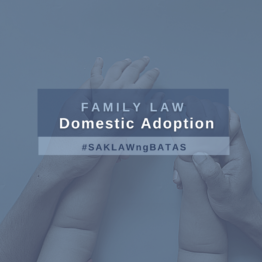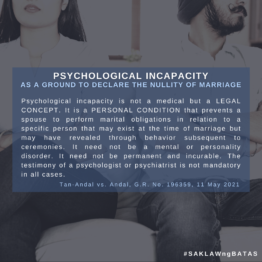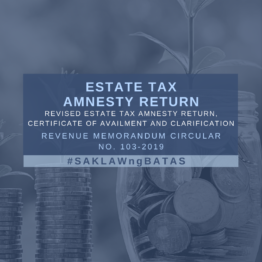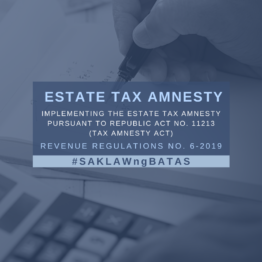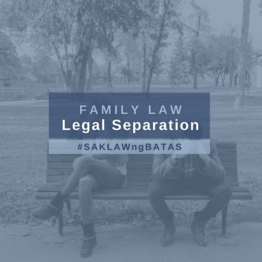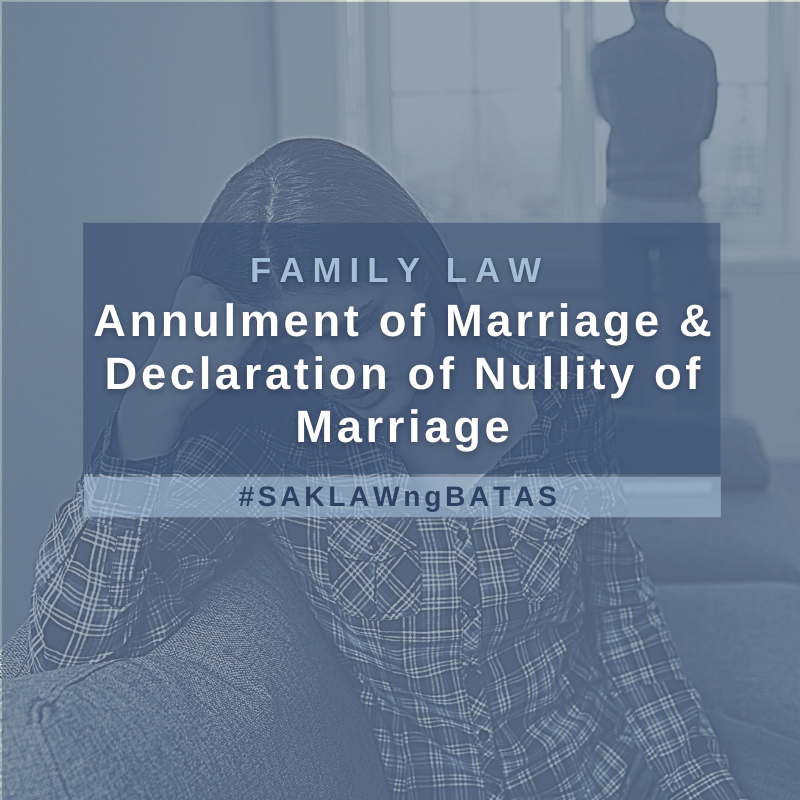
Learn more about declaration of nullity of marriage, the legal grounds, effects of declaration of nullity of marriage, the requirements, procedure, and cost considerations.
A. Declaration of Nullity of Marriage, Generally
The declaration of nullity of marriage applies to marriages that are null and void from the beginning (void ab initio), due to the absence of at least one of the essential or formal requisites of marriages. It is convenient to classify these void ab initio marriages into five categories: (a) void marriages due to lack of requisites (Family Code [“FC”], Article 35); (b) void marriages due to psychological incapacity (FC, Article 36); (c) incestuous marriages (FC, Article 37); (d) marriages against public policy (FC, Article 38); (e) bigamous marriages (FC, Article 41); and (e) void subsequent marriage, when one of the spouses remarry without complying with the recordal requirement of the judgment of annulment or absolute nullity of the previous marriage, etc. (FC, Article 52 and 53). The requisites for each of the aforementioned grounds are more specifically described in the Family Code and in cases decided by the Supreme Court.
The declaration of nullity of marriage is distinguished from the annulment of marriage, which considers the marriage valid and existing until it is annulled. The grounds for annulment of marriage must have been existing at the time of marriage, and include lack of parental consent (FC, Article 45[1]), insanity (FC, Article 45[2]), fraud (FC, Article 45[3]), duress (FC, Article 45[4]), impotence (FC, Article 45[5]), and serious and incurable sexually transmissible disease (FC, Article 45[6]).
The declaration of nullity of marriage is also different from legal separation, which is a legal remedy for couples suffering from a problematic marriage. The grounds for legal separation may have arisen after the marriage, and may be filed on the grounds provided under Article 55 of the FC). In legal separation, the couple is allowed to live apart and separately own assets. However, legally separated couples are not permitted to remarry, since their marriage is still considered valid and subsisting.
B. Effects of Declaration of Nullity of Marriage
Below are the legal consequences of the declaration of nullity of marriage:
1. Property Relations. The absolute community of property (“ACP”) or the conjugal partnership (“CP”), as the case may be, shall be dissolved and liquidated.
In void ab initio marriages (except those under Article 40 of the FC), the property regime of unions without marriage shall apply (c.f. FC, Articles 147 and 148). There are differences between unions where the parties are capacitated to marry each other (Article 147 applies) and unions where the parties are not (Article 148 applies).
Under Article 147, there is a presumption that the contributions are equal. Property acquired by either exclusively belongs to such property, subject to proof. Property acquired by both through their work/industry is co-owned. The property relations between a man and a woman whose marriage was declared null and void on the ground of psychological incapacity (FC, Article 36) is governed by this article. Note that, even if one of the spouses did not contributed materially to the common fund, but the said party took care of the household, the other party and their common children, these acts are considered the said party’s contribution to the common fund (Buenaventura v. Buenaventura, G.R. Nos. 127358 & 127449, 31 March 2005).
Under Article 148, there is no presumption of joint acquisition. There is a presumption of equal sharing only when there is evidence of joint acquisition but none as to the extent of actual contribution. Otherwise, property acquired by either exclusively belongs to such property, and property acquired by both through their work/industry is owned by them in common in proportion to respective contributions.
2. Status of Children Born/Conceived before Declaration of Nullity. The children are deemed illegitimate, except when the ground for the declaration of nullity is psychological incapacity or a void subsequent marriage under Article 53 of the FC.
3. Custody of Children. During the pendency of the petition (pendente lite), the custody of children will be governed either by written agreement, or by court order, based on the best interest of the child. The court will apply the following order of preference, both parents jointly: (a) either parent (may consider the choice of child over 7 years, (b) unless such parent is considered unfit), (c) surviving grandparent (if several, then choice of child over 7 years, unless grandparent chosen is unfit/disqualified), (d) eldest brother/sister over 21 unless unfit/disqualified, or (e) any other person deemed suitable by the court.
After the decree, the court shall award custody to the innocent spouse, but no child under 7 years shall be separated from the mother unless there are compelling reasons.
4. Child Support. Pendente lite, child support will be governed by either written agreement, or in the absence thereof, from properties of the ACP or CP. After decree, either parent or both may be ordered by the court to given an amount necessary for support in proportion to resources/means of giver and necessities of the recipient.
5. Spousal Support. Pendente lite, spousal support will be governed by either written agreement, or in the absence thereof, from properties of the ACP or CP, considered as an advance to be deducted from the share of the spouse supported during liquidation. There may be restitution of spousal support if after decree, the court finds that the person providing support pendente lite is not liable therefor.
C. Outline of Steps
Below is a general outline of the steps in the declaration of nullity of marriage. Please note that in some instances, these steps may not be followed.
1. Preparation / Psychiatric Evaluation. The client goes to the lawyer and discusses his/her case. After conferring with the lawyer and submission of all of the requirements, the lawyer will draft the petition for declaration of nullity of marriage.
If the ground for the declaration of nullity of marriage is psychological incapacity, it is advisable to secure the services of an expert witness (psychologist/psychiatrist) at this stage. The expert witness will later on testify on the psychological incapacity of the petitioner and/or the respondent. It is also advisable that the executive summary of the report of the expert witness form part of the petition.
2. Filing of Petition. The petition is filed before the Central Office of the Regional Trial Court. Cases involving marriage and family matters will be raffled only to designated Family Courts. This will take about a week. After the raffle, the petition will be forwarded to the selected court.
3. Summons. The court will issue summons one or two weeks after the case is raffled. The respondent has 15 days to file his/her answer. In some instances, the lawyer of the respondent may ask an extension of 15 days to file his/her answer or any pleading.
4. Notice to the Office of the Solicitor General (OSG). The court will issue an order requiring the petitioner to submit copies of the petition to the OSG and the prosecutor assigned. Note, however, that under pertinent rules, a copy of the petition should be furnished to the OSG within 5 days from filing thereof.
5. Collusion Hearing. The judge will order the prosecutor assigned to the case to investigate whether collusion exists between the parties and if the evidence submitted is not fabricated or suppressed. The prosecutor is usually given 20 days from receipt of the order to investigate the parties. The report of the investigation of the prosecutor should be submitted 10 days after the 20-day period.
6. Preliminary Hearing/ Pre-Trial Order. The court will hold a preliminary hearing, which requires both parties to attend. A pre-trial order will be issued. Usually the preliminary hearing is called about two to four months after the filing of the petition.
7. Hearing. This is the time when the petitioner will present his/her evidence of psychological incapacity. The number witnesses will depend on the case, but usually, two to three witnesses will be enough, if the case is not contested (meaning, the respondent will not object). The witnesses will be the petitioner herself/himself, the expert witness and one collaborating witness.
Below is the order of presentation of evidence:
a. Presentation of the petitioner herself/himself
• Direct examination of the petitioner by her counsel
• Cross-examination by the State
• Redirect examination by the petitioner’s counsel
• Re-cross-examination by the State.
b. Presentation of the psychologist or psychiatrist
• Direct examination of the petitioner by his/her counsel
• Cross-examination by the State
• Redirect examination by the petitioner’s counsel (if necessary)
• Re-cross-examination by the State (if necessary)
c. Formal Offer of Exhibits
d. Comments/Objections to the Formal Exhibits by the State Prosecutor
• The prosecutor is given an opportunity to comment or object to the offer exhibits. (10-15 days from receipt of the Formal Offer of Exhibits)
8. OSG Certification. An order will be issued directing the OSG to issue a certification briefly stating its reasons for its agreement or its objection to the petition within 30 days from the receipt of the said order. Likewise, the petitioner will be directed to submit all exhibits and transcribed stenographic notes to the OSG within 7-15 days from receipt of the order.
9. Decision. The Court will then issue an order that the case is submitted for resolution. The decision may be released 30-90 days after the said order is issued.
A declaration of nullity of marriage may be finished from 10 months or several years depending on various factors like the complexity of the case (e.g. properties and custody, support are heavily contested), availability of the court, witnesses and documentary evidence, and also the place where the petition will be filed.
D. Requirements and Costs
Below is a list of some of the requirements before filing a petition for declaration of nullity of marriage:
• NSO copy of marriage certificate of the spouses and birth certificates of the children (obtained within 6 months from the filing of the petition)
• Barangay certificate and Community Tax Certificate evidencing residence over the last 6 months of the province or city where the petition will be filed
• Psychiatric evaluation of the spouses (if the ground relied upon is psychological incapacity)
• Copy of marriage settlement or pre-nuptial agreement, if any
• Copy of agreement, if any, relating to custody, support, etc.
• Inventory of properties of the spouses and of the ACP or CP (Please see questionnaire or other document request list of the counsel)
• List of witnesses (Please see questionnaire to be provided by the counsel)
• Other documentary or object evidence
The major cost components of having a marriage declared void ab initio include the following:
1. Filing Fee (Under PhP10,000.00, if no properties are involved; higher, if there are properties involved);
2. Legal Fees (Acceptance Fee, Pleading Fees, Appearance Fees); and
3. Psychological/Psychiatric Evaluation and Expert Witness Fees (varies, estimated PhP40,000 to PhP60,000.00).
Disclaimer: All of the information on this website is provided as general information, not as legal advice, nor as a solicitation for legal services. The information is not provided in the course of an attorney-client relationship between Atty. Salma F. Angkaya-Kuhutan and anyone who views it. Viewers should not rely on the information contained in this website when making decisions regarding legal matters but should consult a qualified attorney for legal advice. You should not act based solely on the information found on this website and are strongly advised to seek the legal opinion of a lawyer.
You may contact the Attorney through the information provided on this website if you are interested in the legal representation, counseling, and related legal services that we provide.

